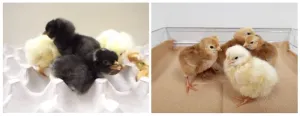(Press-News.org) Study of search trends from Google and Yandex shows an absence of “rally round the flag” effect in the Russian population, as claimed by state-sanctioned polling.
Wellbeing among Russians is at lowest since invasion and close to ten-year low of pandemic, while military mobilisations saw huge spikes in anti-regime web searches.
Search trends track official polling for years preceding invasion, then diverge wildly from early 2022, suggesting Russian polling is now highly unreliable.
A new study analysing online search terms used every day by millions of Russians suggests that – contrary to official data from Russian polling agencies – the invasion of Ukraine did not lead to a national “war rally” in happiness and life satisfaction among the Russian population.
In fact, levels of wellbeing and public morale in Russia may be close to their lowest in a decade, with internet search data revealing a “limited appetite among ordinary Russians for the war”, according to a University of Cambridge report.
Research shows that web searches related to anti-war and anti-Putin sentiment surged during the early invasion, and continued to spike at points of military mobilisation involving mass conscription. This has tapered off since the Kremlin switched to relying on mercenaries and prison recruits.
However, the study also suggests that Western economic sanctions had little effect on Russian households, with the financial situation of consumers and businesses appearing to stabilise rapidly in the spring of 2022.
State-sanctioned polling from the Russian Federation is no longer reliable, say political scientists, with data skewed by public fear of speaking against the war or Putin, as well as suspected government manipulation and dubious changes to methodology.
Researchers from the universities of Cambridge and Surrey analysed data collected through Google Trends on a daily basis from 2012 until April 2023, and cross-referenced it with the last 12 months of search data from Russian tech giant Yandex, to assess public sentiment in Russia.
They found that, for several years preceding Russia’s most recent invasion of Ukraine, web search trends closely matched the data from major Russian pollsters such as the Levada Center and VCIOM*. From early 2022, however, results dramatically diverged.
Russian polling after the invasion saw Putin’s ratings leap to 80%, with self-reported life satisfaction apparently closing in on record highs earlier this year. Yet search engine data shows public mood deteriorating, while searches for terms linked to “tacit dissent” rose sharply.
The report’s authors plan to continue updating their dataset, arguing that online search trends are now a more accurate proxy for Russian public opinion than data from the country’s leading survey institutes. The initial report is published by Cambridge’s Bennett Institute for Public Policy.
“Online search data has been proven to be a powerful tool for inferring the beliefs and attitudes of national populations,” said Dr Roberto Foa, report co-author from the University of Cambridge. “Unlike social media data, online searches represent a much wider section of the population.”
“Web searches are felt to be private, and often reflect internal thoughts and anxieties that people would not wish to broadcast. Such data provides insight into the public consciousness within repressive states, where truth is hidden by a fog of fear and disinformation.”
“Polling from agencies within Russia shows the war boosted morale, but our research suggests that the national public mood is near its lowest level for a decade,” said Foa.
“Online search data shows the Russian people are not simply passive subjects. The legitimacy of the regime is being eroded by failure in war and the demand for personal sacrifice at the altar of Putin’s dictatorship.”
The researchers tracked rates at which certain words and phrases were web-searched. These included mental health symptoms such as ‘depression’ and ‘insomnia’ to indicate wellbeing, and terms related to personal finance emergencies such as ‘bankruptcy’ and ‘eviction’ to measure the state of household finances.
Wellbeing search trends closely matches the pattern of VCIOM polling on life satisfaction right up to February 2022, when VCIOM data leapt by fifteen percentage points, while online search data for wellbeing flatlined.
The detailed nature of the web search data allowed researchers to create a weekly rolling average of national wellbeing in Russia, which shows a continual overall decline following the onset of war.
A mild bump in public sentiment occurred right at the point of invasion – but was extinguished as soon as 4 March 2022, when the Kremlin passes the War Censorship Act.
By April of this year, public mood among Russians was at its lowest since the invasion and only marginally higher than a 2021 nadir during the worst of Russia’s coronavirus crisis.
Google and Yandex data shows levels of financial stress quickly bounced back to pre-war levels, with initial shocks from Western sanctions only lasting throughout March 2022 for Russian households.
However, the financial impact of the pandemic on Russians was severe, with little government help, and sanctions “blunted” what had been a steady recovery, say researchers, who found no lift in economic sentiment since the war. Yet official polling has financial satisfaction at a five-year high.
The study also looked at anti-war searches such as ‘pacifism’, ‘no war’ and anti-Putin phrases – the portmanteau ‘Putler’, for example – to gauge the extent to which many Russians privately contemplate political dissent when online.
Searches for names of outspoken Putin critics Boris Nemtsov (assassinated) and Alexei Navalny (imprisoned) as well as famously anti-authoritarian writers – from Orwell to Solzhenitsyn – were included in the analysis.
Anti-war and anti-regime online searches saw huge spikes around conscription announcements, such as the call-up of aging reservists in May 2022 and last September’s partial mobilisation order**, along with smaller but still significant jumps during periods of heightened Russian casualties.
“Ordinary Russians are more likely to think critically of the regime and search online for opposition movements when the chances increase that they or their loved ones will be sent to fight,” said co-author Dr Roula Nezi from the University of Surrey.
“Russia may have a vast population to draw on, but the Kremlin risks a tipping point of public dissent if it keeps forcing Russian citizens to fight in Ukraine. This could explain a growing reliance on aerial bombardment and use of convicts in the fighting,” said Nezi.
Web search data tallies with this shift in Russian tactics. Since last autumn, what researchers describe as “cognitive dissent” has stayed at much lower levels while the Kremlin has been emptying prisons onto frontlines and leaning on long-range assault rather than mobilising its citizens.
NOTES:
*The Levada Center is a politically independent Russian polling and research organisation that branched off from the Public Opinion Foundation in 2003. The Russian Public Opinion Research Center (VCIOM) emerged in the wake of the Soviet Union’s dissolution. It is the oldest polling institution in Post-Soviet Russia.
** In the week following a mobilisation announcement, online searches using keywords categorised by researchers as ‘dissent’ terms rose by 1.845 standard deviations.
The proportion of internet users in Russia is high by international standards: 85% of the population (the same as France). Google only accounts for a third of Russian internet users, while Russian search engine Yandex accounts for much of the rest. The researchers pulled a year’s worth of data from Yandex using the Wordstat tool to check for discrepancies, but found little difference in results from the two search engines.
To check whether fears of government monitoring were causing self-censorship bias in searches by Russian citizens, data from within Russia was compared with searches conducted in the Russian language but appearing to emanate from Germany, concentrated around major VPN hubs such as Frankfurt. They found little difference in results between Russians who had and had not disguised their location using VPNs. END
Online search data shows Russian morale remained low and ‘tacit dissent’ spiked after invasion of Ukraine
2023-05-17
ELSE PRESS RELEASES FROM THIS DATE:
Study finds carrying pollen heats up bumble bees, raises new climate change questions
2023-05-17
A new study from North Carolina State University finds carrying pollen is a workout that significantly increases the body temperature of bumble bees. This new understanding of active bumble bee body temperatures raises questions about how these species will be impacted by a warmer world due to climate change.
Spend a bit of time at a nearby flower patch and you will spot a fuzzy bumble bee with yellow bumps on her back legs. These yellow bumps are solid packets of pollen that have been carefully collected during the bees’ foraging trip for transport back to their nests. And while bees may seem to move from flower to flower with ease, these pollen packets ...
Pre-primary education “chronically” underfunded as richest nations drift further away from 10% aid goal
2023-05-17
International aid for pre-primary education has fallen further behind an agreed 10% spending target since the COVID-19 outbreak, according to new research.
The report, compiled by academics at the University of Cambridge for the global children’s charity, Theirworld, highlights “continued, chronic” underfunding of pre-primary education in many of the world’s poorest nations, after years of slow progress and pandemic-related cuts.
Early childhood education is widely understood to be essential to children’s successful cognitive and social development and to breaking cycles of poverty in poorer countries. ...
Confirming the safety of genetically edited allergen-free eggs
2023-05-17
Researchers have developed a chicken egg that may be safe for people with egg white allergies. Chicken egg allergies are one of the most common allergies in children. Though most children outgrow this allergy by age 16, some will still have an egg allergy into adulthood. Egg white allergies can cause a variety of symptoms, including vomiting, stomach cramps, breathing problems, hives, and swelling and some people with egg white allergies are unable to receive certain flu vaccines.
Using genome editing technology, researchers have produced an egg without ...
Otago researchers reveal impact of ancient earthquake
2023-05-17
By combining the scientific powerhouses of genetics and geology, University of Otago researchers have identified a new area of coastal uplift, which had been hiding in plain sight.
The previously unknown region of earthquake uplift, in Rarangi, Marlborough, was discovered using a combination of new data from laser mapping and kelp genetics.
Co-author Professor Jon Waters, of the Department of Zoology, says the study gives new insights into the changes in Aotearoa’s landscapes and the recent history of earthquake impacts.
“In a geologically well studied country like New Zealand, there ...
ESHRE publishes recommendations to tackle environmental threats to fertility and reproductive health
2023-05-17
Political and legislative action is urgently needed to respond to threats posed by the link between environmental factors and widespread infertility, says the European Society of Human Reproduction and Embryology (ESHRE) today (Wednesday).
This is one of the (8) recommendations outlined in a list of statements published by ESHRE for the first time. The aim is to draw attention to the growing threat from climate change, pollutants, hormone-disrupting chemicals, toxic substances, and other related risks.
The ...
What’s a park worth to the economy?
2023-05-17
A new framework developed by University of Waterloo researchers demonstrates the significant economic health savings and benefits from urban park investments.
In the first case study of its kind in Canada, researchers looked at Peterborough’s new Quaker Foods City Square park, which cost taxpayers $6.4 million, and have estimated the economic value of physical and mental health benefits that could come from it at more than $4 million per year. The framework considers the health savings associated with improved mental health and better air quality, the ...
New liquid biopsy method offers potential fornoninvasive Parkinson’s disease testing
2023-05-17
New liquid biopsy method offers potential for noninvasive Parkinson’s disease testing
EVtrap technology identifies proteins from brain cells in urine samples
WEST LAFAYETTE, Ind. – A team led by researchers at Purdue University and Purdue spinoff company Tymora Analytical Operations has developed a technique that may reveal signs of Parkinson’s disease in urine samples.
The technique gives researchers a chance to see if LRRK2 (leucine-rich repeat kinase 2) proteins, which are linked to Parkinson’s disease, and their downstream pathways are altered in samples from Parkinson’s patients. The method could eventually lead ...
GW to co-lead a new $20 million NSF AI institute
2023-05-16
WASHINGTON (May 16, 2023) - The George Washington University is co-leading a multi-institutional effort supported by the National Science Foundation (NSF) that will develop new artificial intelligence (AI) technologies designed to promote trust and mitigate risks, while simultaneously empowering and educating the public.
The NSF Institute for Trustworthy AI in Law & Society (TRAILS) announced on May 4, 2023, unites specialists in AI and machine learning with systems engineers, social scientists, legal ...
Discrimination, crime and suicidal thoughts associated with greater odds of firearm ownership among Black adults
2023-05-16
Black adults – particularly Black women – with higher levels of education and experiences of discrimination and crime are more likely to own a firearm, according to a study by the New Jersey Gun Violence Research Center at Rutgers.
In a new study appearing in the Journal of Clinical Psychology, researchers found that Black adults who endorsed firearm ownership were more likely to grow up in homes with firearms, had previously shot a firearm and planned to acquire a firearm in the coming year.
“The higher rates of firearm ownership among highly educated Black women were somewhat surprising to us,” said Michael Anestis, executive director ...
Some young cancer survivors face higher risk of premature heart failure
2023-05-16
Mean age at diagnosis of heart failure was 32 years old
First study to estimate risk of heart failure among young adult cancer survivors treated with this category of chemotherapy
Study raises awareness for patients, clinicians to monitor for heart failure symptoms, consider strategies for prevention
CHICAGO --- Imagine surviving cancer only to learn the drug that saved your life has introduced a completely different health risk: heart failure.
A new Northwestern Medicine study has found young adult cancer survivors (between 18 and 39 years old at diagnosis) were at higher risk (2.6 times) of heart failure when treated with anthracyclines, a specific category ...



